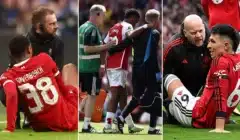Ultimate Guide to Poker Terms and Terminology
Poker is a casino game that has been around the world and existed for over two centuries. As a result, there are plenty of variants available and lots of poker terms and phrases that hold special meaning in the card game. No matter whether you’re a beginner or aspiring to go pro, knowing this terminology can help you understand what is happening while communicating with your opponents and dealers effectively.
Overview of Important Poker Terms
The following list of poker terms features summarised definitions. If you want to learn more, you click on the word or phrase to view a more detailed explanation.
A
B
- Backdoor Draw – A drawing hand that requires both the turn and river cards to complete.
- Bad Beat – A situation when a strong hand loses to an even stronger hand, often unexpectedly.
- Bankroll – The total amount of money a player sets aside to gamble.
- Blinds – Mandatory bets posted by players sitting to the left of the dealer before the cards are dealt.
- Bluff – A strategy where a player bets or raises with a weak hand to convince opponents to fold stronger hands.
- Bubble – The point in a tournament where the next player eliminated will not receive a payout, but all remaining players will.
- Burn Card – A card that is discarded from the top of the deck before dealing the Flop, Turn, or River to prevent cheating.
C
- Check – Passing the action to the next player at the poker table without making a bet, provided no raise has been made in the current round.
- Check-Raise – A strategy where a player checks early in a betting round, intending to raise if another player bets.
- Community Cards – Cards dealt face-up in the centre of the table that are shared by all players.
D
F
- Flop – The first three community cards dealt face up in the centre of the table.
- Fold – Discarding one’s hand and forfeiting the current pot.
- Freeroll – A tournament with no entry fee but still offers prizes.
- Full House – A hand containing a Three of a Kind and a Pair.
G
- Gutshot Straight – A Straight hand completed by a single inside card, such as holding a 4 and 6 and hitting a 5.
H
- Heads-Up – A poker situation where only two players remain in the hand or game.
- Hole Cards – The private card dealt to each player in games like Texas Hold’em.
I
- Implied Odds – The potential future winnings relative to the current cost of a bet.
K
- Kicker – A side card that determines the winner when two players have hands of the same rank.
M
- Muck – To fold a hand without revealing it or the pile of discarded cards.
N
O
P
- Pot – The total amount of chips or money in the centre of the table that players compete for in a hand.
Q
- Quads – Four of a Kind.
R
S
T
V
- Value Bet – A bet made to extract value from an opponent, typically when holding a strong hand.
A Detailed Explanation of Poker Terms
If you’d like to learn more about any particular poker word or phrase, you’ll find a detailed explanation below.
All-In
By going all-in, players bet all their remaining chips. This can happen at any stage of the game and is often a high-stakes move not recommended for players looking to gamble responsibly since, while it may lead to a massive win, can also result in an immediate knockout.
If a player goes all-in and is called, they can only win the amount they have wagered. Any additional chips go into a side pot for the remaining players to contest.
Ante
A small, mandatory bet that all players at the table must post before the start of a hand. Antes are commonly used at later stages of poker tournaments or stud games, in addition to the blinds. However, they are the first mandatory bet in many casino-style variants, including 3 Card Poker. The purpose of the Ante is to build the pot, ensuring that there is always something to play for, thus encouraging action from players.
Backdoor Draw
This is a situation where the player needs both the Turn and River cards to complete a drawing hand, such as a Flush or Straight. For example, if a player has two hearts and the Flop has only one heart, a Backdoor Draw would require two more hearts that could only come from the Turn and the River, to complete a Flush.
While less likely than a Front Door Draw, which means completing a draw with just one card, a Backdoor Draw can still significantly impact a player’s strategy.
Bad Beat
Occurs when a player with a seemingly dominant hand is outdrawn by an opponent with a weaker hand that improves significantly on later streets. This term is often used to describe the frustration of losing a hand were the odds heavily in favour of the losing player. Bad Beats are an inherent part of playing poker and add to the game’s unpredictability.
Bankroll
The sum of money specifically allocated for playing land-based or online poker. Effective bankroll management is vital for sustaining long-term gameplay and involves balancing the risk of losing money with the opportunity to participate in higher-stakes games. Players are advised to only risk a small percentage of their bankroll in any single game or tournament.
Blinds
According to Omaha and Texas Hold’em rules, blinds are forced bets posted by two players to the left of the dealer. The first small blind is posted by the player sitting directly to the left of the dealer while the big blind is posted by the player on the small blind’s left.
The big blind is typically double the small blind and both are used as incentives for players by ensuring a minimum prize in the pot.
Bluff
Bluffing is a crucial poker tactic involving a player pretending to have a stronger hand than they actually do by making aggressive bets or raises. The goal is to induce opponents to fold their potentially stronger hands, allowing the bluffer to win the pot despite holding an inferior hand. Effective Bluffing requires understanding opponent tendencies and game context.
Bubble
A point in a poker tournament where the next player eliminated will not receive a payout, but all remaining players will. For example, if the top 10 players in a tournament get paid, the player who finishes 11th is said to Bubble and misses out on any prize money. This stage is critical in tournaments as players often adjust their strategies to either survive or exploit the situation.
Burn Card
A card that is discarded from the top of the deck before dealing the community cards in Texas Hold’em and Omaha. The purpose of burning cards is to prevent cheating or card tracking. Burn cards are not shown to the players and are placed aside by the dealer before each round of betting.
Check
This poker action is taken when a player chooses not to bet but remains in the hand. Checking is only an option if no previous bets have been made during that round. If all players check, the next card is dealt, or the next round of betting begins. Checking can be a strategic move to see how opponents act or one of the simplest poker strategies to disguise the strength of a hand.
Check-Raise
A poker term that defines a strategy in which a player checks early in a betting round with the intention of raising if another player bets afterwards. This move is used to trap opponents and build a larger pot, often when the player has a strong hand. Check-raising can also be a bluff, representing a strong hand to force opponents to fold.
Community Cards
A set of cards dealt face-up in the centre of the poker table and shared by all players to form their final hand. Both Texas Hold’em and Omaha Poker rules include reference to Community Cards. Their use creates a dynamic element to the game, as players must adapt their poker strategies based on shared information.
Dealer
The individual responsible for shuffling and dealing the cards, overseeing the action, and managing the pot. At live casinos, a professional dealer handles these duties. During cash games or tournaments, the dealer’s position is important since it determines which players must place the blinds and which play first.
Draw
A hand that is not yet complete but has the potential to become a strong hand with the right cards. Common examples include Straight Draws and Flush Draws. For example, if a player has four cards to a Flush, they are on a Flush Draw.
Draws are important in poker strategy as they can dictate whether a player should continue in a hand or fold based on the odds of completing the draw.
Flop
The Flop refers to the first three community cards dealt face-up after the first round of betting in Texas Hold’em and similar variants. These cards are placed at the centre of the table and are shared by all participating players. The Flop is a critical moment in the game as it significantly influences the potential strength of each player’s hand.
Fold
By folding, players discard their hand and forfeit any chance of winning the pot. Folding is a crucial aspect of poker strategy, as knowing when to fold can prevent a player from losing more chips in a losing situation. It’s often said that successful poker is as much about the hands you fold as the ones you play.
Freeroll
A poker tournament with no entry fee that still offers cash prizes to the winners. Available at some of the best online poker sites, Freerolls are popular amongst beginners and players looking to build a bankroll without risking their own money.
While the competition in freerolls can be less intense due to a lack of an entry fee, they provide valuable experience and the potential to win real money or other prizes.
Full House
A poker hand that consists of three cards of one rank and two cards of another rank, such as three As and two Ks. As players learn how to play poker, they soon find out that this hand is one of the strongest as it ranks above a Flush and below a Four of a Kind. Full Houses are powerful because they are difficult to beat without holding a Four of a Kind or better.
Gutshot Straight
A Straight that is completed by a single inside card. For instance, if a player holds a 4 and 6, and the board shows a 7 and 8, the player needs a 5 to complete the Straight. Gutshot Straights are less likely to hit than an Open-Ended Straight which can be completed with either of two cards. However, they can still be a valuable draw in certain situations.
Heads-Up
A situation where only two players are competing, either in an effective hand or at the final stage of a tournament. Heads-Up play requires a different strategy from multi-play scenarios, often involving more aggressive tactics and a focus on reading the opponent’s tendencies. The dynamics make it one of the most skill-intensive aspects of poker
Hole Cards
Cards dealt face-down to each player at the beginning of a hand in games like Texas Hold’em or Omaha. These cards are private and can only be seen by the player to whom they are dealt. Hole Cards are the foundation of a player’s hand and strategy and combine with community cards to create the best possible hand.
Implied Odds
A concept used to determine whether it is worth continuing in a hand based on the potential future payouts if the hand improves. Unlike pot odds, which only consider the current pot size, Implied Odds factor in expected future bets that could be won if the player’s hand improves. Understanding them is crucial for making profitable decisions in drawing situations.
Kicker
A side card used to break the ties between players who have the same hand rank. For example, if two players have a Pair of Ks, the player with the higher Kicker, the next highest card in their hand, wins. Kickers play a crucial role in determining the winner when hands appear to be tied.
Muck
To fold a hand without revealing it, typically after an opponent has shown a stronger hand. The term also refers to the pile of discarded cards. In most poker games, once a player mucks their hand, it is considered dead, and they cannot reclaim it. Mucking is a common practice used to avoid giving away information about one’s playing style or hand strength.
No-Limit
In No-Limit Poker, there is no maximum bet limit, meaning players can wager any or all of their chips at any point during a hand. The format is most commonly associated with Texas Hold’em since the ability to make large bets or go all-in adds a psychological dimension to the game. This format requies careful risk management and a deep understanding of opponents’ tendencies.
Nuts
The best possible hand given the current state of the board. For example, if the board shows 10, J, Q, K, and A with no Flush possible, an Ace-high Straight (A, K, Q, J, and 10) is the Nuts.
Holding the Nuts is the most advantageous position in poker, as it guarantees a win if the hand goes to a showdown. Identifying the Nuts or the potential for opponents to have the Nuts, is crucial in decision-making.
Out
Any card that, if dealt, will improve a player’s hand to one that could win the pot. For example, if a player has four cards to a Flush, any card of the same suit remaining in the deck would be considered an Out. Calculating the number of Outs and understanding their impact on a hand’s potential strength is a fundamental skill in poker strategy.
Overpair
A pocket Pair that is higher than any of the community cards on the board. For example, if a player holds pocket Ks and the board shows a 7, 9, and 2, the Ks are an Overpair. This type of Pair forms a strong hand in poker, but its strength can vary depending on the texture of the board and the actions of the players.
Pot
The pot is the total sum of money or poker chips that players bet during a hand. The pot continues to grow as players place additional bets. Winning the pot is the main objective in poker, and while the basic premise to doing so is having the strongest hand, research suggests that oftentimes, it’s the skill to outmanoeuvre opponents that determines the winner.
Quads
A term used to describe a Four of a Kind, a hand that consists of four cards of the same rank, such as four Qs. Quads are an exceptionally strong hand and only a Straight Flush or Royal Flush beat it. They are rare hands, and when they occur, they often lead to significant pots.
Raise
This action consists of increasing the size of the current bet. After a poker player raises, must call or match the raise, raise again, or fold. Raising is a key tactic in poker, especially when combined with a bluff, and can be used to build the pot, protect a strong hand, or pressure opponents to fold.
Rake
The portion of the pot taken by the house or casino as a fee for hosting the game. In most poker cash games, the Rake is a small percentage of each pot, typically capped at a certain amount. In tournaments, it is usually included in the buy-in.
Rake is the way in which operators of online casinos and poker rooms generate revenue. Understanding the poker Rake structure is important as it can affect long-term profitability. Moreover, some sites offer casino bonuses that return part of the Rake back to qualifying players.
River
The River is the last of the five community cards dealt face-up in Texas Hold’em, Omaha, and similar variants. After the River card is dealt, a final round of betting takes place. The River often determines the final outcome of the hand, making it one of the most crucial moments in a poker game.
Showdown
This is the stage of a poker game that follows the final round of betting when any remaining players show their hands. The player with the best hand, according to the poker hand rankings, wins the pot. If all but one player folds before the showdown, the remaining player wins the pot without having to show the cards.
Slow Play
The Texas Hold’em or Omaha strategy of underplaying a strong hand to lure opponents into betting more. By not raising or making aggressive moves, a player can disguise the strength of a hand encouraging others to bet or raise. The goal is to keep opponents in the hand and extract more value from them, rather than scaring them off with aggressive behaviour.
However, slow playing can be risky, especially if an opponent catches a better hand on later streets.
Three-Bet
A re-raise placed after an initial bet and a raise. For example, if Player A bets, Player B raises, and Player C re-raises, Player C’s action is called a Three-Bet. This move typically indicates a strong hand and is used to put pressure on opponents.
Three-Betting is a common strategy in aggressive play, especially in Hold’em Poker, to either build a pot with a strong hand or bluff opponents into folding.
Tilt
A state of emotional frustration or anger that negatively affects a player’s decision-making. When on Tilt, a player might make irrational or overly aggressive plays, often leading to significant losses. Tilt can be triggered by a bad beat, losing a large pot, or simply a run of bad luck.
Managing Tilt is crucial for long-term success in poker, as otherwise, it can lead to a downward spiral of poor decisions. Being aware of it and knowing how to prevent it can help you gamble safer.
Turn
The Turn is the fourth community card dealt face-up on the board in Omaha, Texas Hold’em, and similar variants. It follows a round of betting after the Flop and can be a pivotal card that changes the dynamic of the hand. The Turn often leads to larger bets as players try to maximise their winnings or protect their hands.
Value Bet
A bet made with the intention of getting called by a weaker hand. The idea is to extract as much money or chips as possible from an opponent who holds a hand that is likely worse than the bettor’s hand but still good enough for the opponent to call. Value betting is a key component of profitable poker play as it maximises winnings when a player is ahead.
Resources
- https://www.gamblingcommission.gov.uk/public-and-players/safer-gambling
- https://www.researchgate.net/publication/251301255_Best_Hand_Wins_How_Poker_Is_Governed_by_Chance





